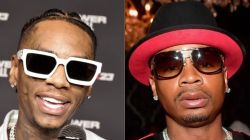Sy Ari Da Kid has garnered an impressive fanbase in his hometown of Atlanta, Georgia. While he has yet to catch on with the Hip Hop masses, his calculated career growth has undoubtedly moved in a single direction. After a cool eleven straight wins as a battle rapper on the Atlanta’s Hot 107.9 station earned him citywide respect and familiarity, his incessant release schedule (he now has at least 20 original mixtapes under his belt) and truthful raps have earned him a different kind of attention. Despite a childhood move to Atlanta, Sy Ari doesn’t rap with much of a Southern accent or cadence and he seems to sit comfortably between his longtime home in the South and his native Bronx, New Yotk.
Regardless of his growing base’s size, it seems obvious that one of his greatest selling points is his genuine relatability as a rapper. His recently released “freestyle” over Migos’ Drake featuring “Versace” single opens up with an obvious but too often untold truth: “Versace, Versace….but wait, I don’t be wearing Versace.” The claim is tongue-in-cheek as much as it is indicative of Sy Ari’s general stance as a rapper. “Ninety percent of the people bumping that record don’t wear it,” he says in our interview, “can’t afford it. You understand what I’m sayin’? Never been to a Versace—I don’t even know where a Versace store is at, so that’s the first thing I wanted to get out because nobody did that. When they hear these harsh realities and they jump back into reality it’s like when you go on vacation and you gotta come back home to that broke-ass apartment. That’s the reality I try to give people: realize who you really are and then try to become a better person after that. Don’t try to become these things that you seeing on TV and all of this stuff.”
Thankfully, his music manages to not come off as preachy or agenda-laden. One of his most popular songs, “If I Was A Trapper,” taken off the first installment of his Definition Of Definition mixtapes, attacks the disconnect between “trapping” and it’s glorification in Hip Hop (the main point is that “trap” rappers, if we are to believe their stories, are inherently bad at one of their jobs in publicising their “work”). It may seem a bit obvious, but Ari’s revelation that everyday truths resound with fans more than half-truth tales of exploits couldn’t come at a better time: “A lot of artists that do the storytelling with the lyrics they might tell other stories, but I started telling my story. And it made people feel like ‘damn, this guy is just like us.’ And so the more and more I started doing it, I noticed people started talking about my music back-to-back-to-back as opposed to what was hot at the time. They would go back to my first project. I noticed, if I could build my fanbase on my own, even if I get a deal and I drop an album and the label doesn’t do it right, I’ll still have the fans that I built from the jump. So I could fall back and still put music out on my own as opposed to feeling like ‘oh I did it with the label and now the label dropped me so everybody who found me through the label is not believing in me.’ So this fanbase that I’m building, I did it straight, from the mud, from the bottom, everything. And that’s why no matter what I do they ride with me, they tell me what they love, what they can relate to, what they don’t wanna hear anymore.” As a result, he hasn’t shied away from tales of his two parent household growing up or his current responsibilities as a single father.

AD LOADING...
Sy Ari Da Kid On The Skills He Built As A Battle Rapper
Still, what gave the emcee his chops on the microphone were the informal battles his friends initiated while still in school. “I used to sell a bunch of snacks and Kool Aid all over school” he remembers, “so I had hustling people skills way back in highschool, I already felt not too nervous around people. That’s the one thing about battling, you need to be on the one with everything. What battling does is you have to memorize your stuff, you have to perform in front of people and then you have to also capture that moment. Doing the whole battling thing really worked out for me even though I didn’t gain a full love for it. Battling, to me, is the toughest thing in music that I’ll ever have to do. The adrenaline was pumping, I love the feeling, I love the competition of battling somebody that I don’t know—you know, battling nowadays is a little different, they prepare for the person weeks ahead of time and write about them. But I wasn’t doing that type of battling, the way it was, you know, back in the day, my homies knew I could rap—I only had a few homies who knew I could rap—and other people had they people who knew they could rap. [They’d] be rapping and my niggas would go up like ‘nah, my nigga better than you,’ and then it’s like ‘alright let’s see.’ We’d end up battling right there on the spot. And to me that’s a real battle, not to take away from the way it is now because things change and I love the way the culture is now because it’s dope, but that’s the way I came up doing it and that’s why now whenever I do shows I’m not nervous. Whether I’m doing shows in front of a hundred people…or a thousand people, when I’m doing shows I don’t get nervous because it doesn’t add up to when I was out there battling in front of five hundred people to a complete stranger and people cheering right after the battle saying I won.
“I think battling is good, a lot of people say they don’t freestyle [or] they don’t battle, that’s just an easy cop out because those are the people that are afraid of the competition. They’re afraid to compete, they’re afraid of rejection, they’re afraid to lose. And that type of stuff is always gonna be bad for Hip Hop. It prepares you for the longevity because in the game right now someone’s always looking to embarrass you on camera, talk about you on the blog, and if you don’t prepare for these things—you know, proper preparation prevents poor performance—it’s gonna hit you.”

AD LOADING...
Despite grinding his teeth in both schoolyard and more formal battle settings, Sy Ari is just as quick to note that it was a scene he knew he had to migrate away from: “I had to take a heat check ‘cause I could have been battling forever but I knew that my calling was much, much bigger than me embarrassing somebody through the music. I have too much of a way of touching people to relate to me as opposed to just constantly battling, battling, battling. So I took what I had from that and I just had to put the brakes to it. Had to.”
Sy Ari Talks About His Current Partnership With Bumpy Knuckles
While he is currently prepping the release of the second installment of his Ultrasound mixtape with DJ Scream and Trapaholics, Sy Ari has just recently made a weighty but happenstance industry connect: “Someone that was working with me…was cool with [some] lady and I guess she sent her my music and maybe she knew [Bumpy Knuckles] and sent it to him. I think it was a track called ‘This Ain’t Hip Hop.’ And he heard it and I guess he liked what he heard, but that’s just one record. “
https://www.youtube.com/watch?v=OydC7iKqfHM(“This Ain’t Hip Hop” [Video])

AD LOADING...
“So I think we ended up saying something to each other on Twitter and then he ended up sending me a beat, and I know he doesn’t really do this a lot. So when I found out that he sent me the beat, I’m not about to sit on this, I got a Hip Hop legend that just sent me a record and wants to see what I’m gonna do with it, there’s no hook or nothing on it. That same exact day I sent it back, I did like a first verse and a hook and left the other verse open. And then I sent it to him and he loved it, it’s a record called ‘Word’ that he produced, and he ended up sending it right back to me with his verse on it. It ended up being a dope record and what worked from there is he told me he liked what he’d been hearing, he’s been paying attention to what I’ve been doing on Twitter, noticing my fanbase. For someone that’s been in Hip Hop for that long, you know, to see something in somebody, he’s worked with so many of the greats as well as being great himself.”
“From right there I wanted to capitalize, all this preparation that I’ve been putting in, here’s my time. I want to be able to be one of the top lyricist in the game and so once I saw that opening there was no time to sit on it [like], “Oh Bump, I’ll book a studio session next week and knock it out.” No, I didn’t even say what I was gonna do, soon as I got that beat I just knocked it out. So I think DJ Premier ended up putting it in rotation on his show, I ended up thanking Premier and Bump on Twitter, Bump and DJ Premier hit me back on Twitter, shouted me out. So right there I’m seeing I’m exactly where I need to be, there’s no time to relax, now’s the time to really kick into next gear. The whole thing with Bump, every time we have a phone conversation, we’re on the phone and he’s giving me this knowledge and it doesn’t feel like a lecture, it almost feels like I’m in this class that I’ve been trying to pay for for the longest and now someone just fronted me the tuition. And I’m sitting in the front of the class and everything that he says makes sense. One thing about Bump is he’s not—it’s not like he’s just talking, he actually means good. He’s one of those people from the street that means good. He’s not only teaching me the mistakes that he made but he’s teaching me the things that he did good and the mistakes that he made that he doesn’t want to see me make. And when you have someone on your side with such a concrete reputation, you can’t lose. And then he actually knows music…this man really knows equipment, knows music, Protools, beats, producing, writing, tone. He showed me little things, little stories. He put me on the phone with Eric B., he put me on the phone with DMC from Run-DMC, and they wasn’t just talking, they heard me and said, ‘You’re dope.’ He put me in front of Big Daddy Kane, I saw all of these legends just associating with Bumpy. So the moment we did that record and he told me he wanted to do a project with me. Literally a couple days after that I booked a flight to New York, from Atlanta, I’m not baller, so I booked a buddy pass, me and my camera man, I got a nigga I did a little feature for, he works for Delta, he got us two buddy passes, we went straight to New York. I went straight to Bump, I went to the studio and he was like, ‘Yo, if you come through later we can cut a couple of records.’ I was like ‘Bump, I don’t even want to record, I just came to meet you face-to-face, I came all the way to New York just to do that.’ Just so he could know how serious I am, to have Premier and Eric B. talking to me, you can’t even pay for shit like that. That’s how the whole thing with me and Bump continues.”
“We’re pretty much ninety percent done with the project within like a month or two. That quick, all through email. It’s called Wisdom And Strength. The whole point of the project, and this is why I love working with Bump, I’ve done over twenty mixtapes, all original stuff, but for the first time—I’ve always orchestrated, I’ve mixed all my projects, I’ve picked all my beats, I wrote all my hooks—with this project Bump is producing everything, he’s giving me direction like ‘do this, we’re gonna do this amount of tracks. We’re gonna call it this.’ And I’m actually comfortable taking all this information, my brain is focused on the music as opposed to worrying about these other things. The whole thing is how the legends from the past—he always brings this up—a lot of them are so angry but they’re not doing anything about it. They’re so angry at the new kids that are coming into the game, messing up the culture but he was saying that they’re actually bad for the culture because they’re not doing anything about it. And he’s actually taking his time to find somebody that’s young that’s about to come into the game and work with [me] and teach me certain things and then we’re actually going back and forth rapping, and that’s what makes it so dope, ain’t nobody did that. That’s the whole point.”
RELATED:Sy Ari Da Kid – “Angels Calling” [AUDIO]



